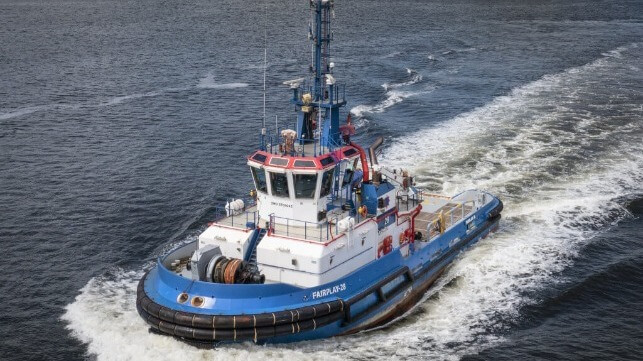New Cost-Effective & Precise Method to Measure Fuel Consumption

[By: LionRock Maritime]
The maritime industry is continuously on the lookout for ways to reduce its fuel consumption. A recent innovation from the towage industry may hold the key. By harnessing advanced machine learning algorithms, this new method offers a cost-effective and precise way to measure fuel consumption with minimal installation. The solution is applicable for vessels across the maritime sphere. As regulatory demands grow and environmental awareness increases, such advancements in data measurement are essential for the industry’s green transition.
For a long time, expensive fuel consumption meters were the only option to accurately measure fuel usage of tugboats. Their installation temporarily put the vessel out of operation, making it unfeasible for many operators. In an attempt to address this issue, LionRock Maritime partnered up with Techbinder to create a cost-effective measuring product with a smooth installation process. The solution is simple, cheap, and offers great accuracy. Given its success with tugboats’ unpredictable sailing patterns, the solution is relevant not only for the towage industry but the entire maritime sector as a whole.
To make the monitoring tool accessible and cost-effective, LionRock Maritime used advanced machine-learning algorithms to estimate fuel consumption. The algorithms can accurately predict fuel consumption based on two primary types of data: operational context and engine Rotations Per Minute (RPM). Operational context includes a variety of parameters such as the tug's speed, load, weather conditions, and the type of operation being conducted (e.g., docking, towing). RPM data provides insights into the engine's operational status, reflecting how hard the engine is working at any given time.
Based on the operational context and RPM data from the engine, the model demonstrated impressive results in its initial trials. Implemented on a tug from Fairplay Towage in the Port of Rotterdam, the system achieved an average deviation of just 1.8% from actual fuel measurements, with a maximum deviation of 3.3%. These figures are particularly noteworthy given the erratic nature of tugboat operations. Further, the low deviation rates in these trials highlight the model’s ability to handle the complexities of real-world maritime operations. This accuracy is crucial for operators who rely on precise data to manage fuel consumption effectively—helping to control costs and reduce environmental impact.
Encouraged by the successful trial, the application of this technology is rapidly expanding. As this technology continues to be tested and refined, it could lead to applications beyond tugboats, potentially benefiting other vessels within the maritime industry. Measuring emissions is increasingly important to keep up with regulatory standards, but companies also acknowledge the significant savings to be made from using less fuel. Having good data with the right contextual information is an essential first step in helping companies become aware of bad sailing patterns and keeping their fuel use under control. Partnering with service providers supports the industry in transitioning to more efficient practices, benefitting operators and the planet.
The products and services herein described in this press release are not endorsed by The Maritime Executive.
